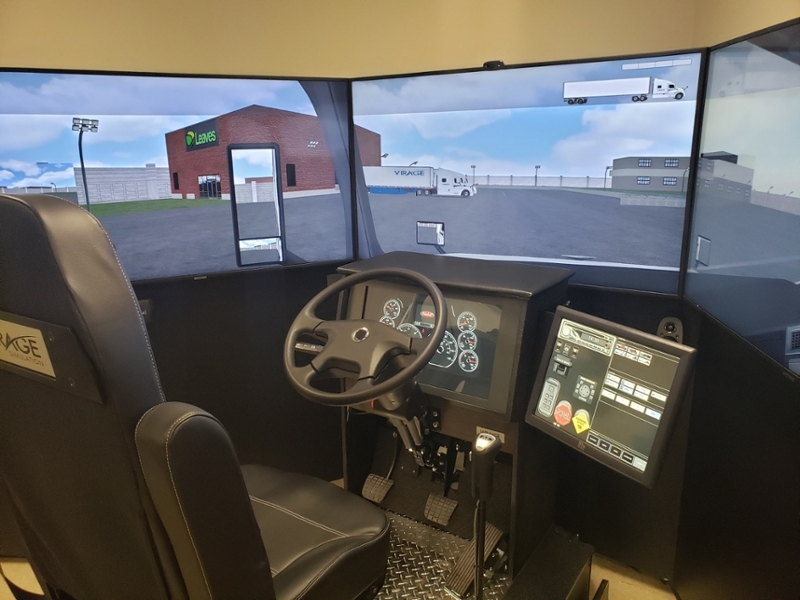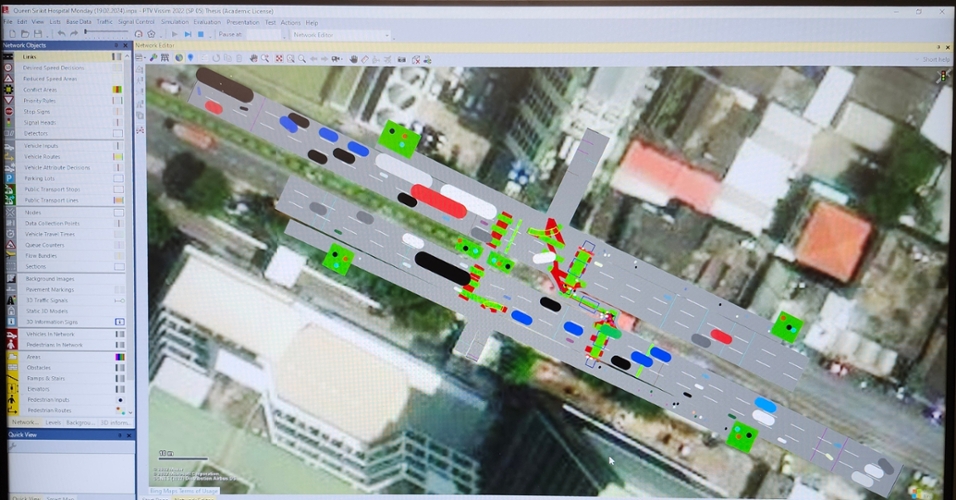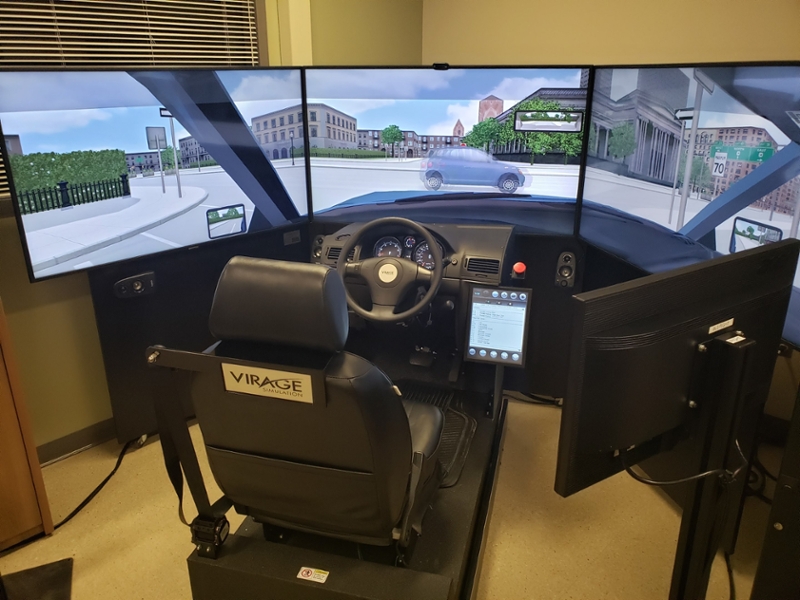Principal Investigator
Title: Examining the effects of cannabis-based edibles on cognitive health and simulated driving performance in young adult drivers
Funding: CAA, Transport Canada, Mitacs, Gaize, and Saskatoon Police Services, 2025.
Description: Since the legalization of cannabis in 2018, the percentage of cannabis users has steadily increased, with 50% of young adults (aged 20-24 years) and 37% of older adolescents (aged 16-19 years) consuming cannabis. Based on young adults high cannabis consumption, there are concerns that their risk of driving while under the effects of cannabis will increase resulting in an elevated crash risk. While studies show evidence that cannabis can impair driving performance, there have been no studies that have examined the effects of cannabis edibles on driving performance. The purpose of this study is to examine the effects of cannabis edibles on the simulated driving performance of young adults.

Title: Examining the associations between functional abilities and simulated driving performance in Canadian long-haul truck drivers
Funding: Mitacs, 2022-2024.
Description: The long-haul trucking sector is an aging workforce with the average long-haul truck driver (LHTD) being middle-aged and older (i.e., above 45 years of age). Often accompanied by age and the inherent lifestyle of this occupation, is a range of chronic diseases which may be associated with worker productivity including the ability to drive, mediated by a LHTDs functional abilities. Despite, prior studies reporting that a variety of functional domains are important for LHTD to perform their job, as well as operate their vehicle safely, no studies have examined the relationship between functional abilities, health, and driving performance in Canadian LHTDs. Therefore, due to the limited information on the driving performance of LHTDs, this study is designed to inform appropriate stakeholders of this relationship and this information may be used in future versions of the Canadian Medical Association (CMA) guidelines for fitness to drive as well as examining potential applications (e.g., challenging driving situations) of the truck simulator for training purposes.

Title: Impact of stakeholder perspectives on improving truck stops in Central Canada
Funding: Mitacs and the University of Saskatchewan: School of Public Health, 2022-2024.
Description: In the trucking industry, truck stops are a major component of LHTD work environment as they serve as an area to park, refuel, eat, and rest, as well as shower and do laundry. However, LHTD report that truck stops in Canada are lacking important amenities which contribute to high rates of chronic disease seen within this occupational group. Therefore, this project is designed to understand the preferences and needs of long-haul truck drivers (LHTD), as well as capture the various perspectives of stakeholders in order to construct an action plan on developing/renovating truck stops in Canada.
Title: Informing the location and implementation of pedestrian crosswalks in Bangkok, Thailand
Funding: USask International Office, 2022-2024.
Description: Thailand is characterized by crowded environments, underdeveloped infrastructure, and careless driving behaviours of drivers. This has contributed to Thailand having the highest fatal crash rate among Asian countries, and the 9th highest fatality rate in the world. Motorcycle-pedestrian accidents account for almost 33% of all traffic fatalities primarily caused by driver speeding and failing to yield/stop. To address this issue, the Thailand government is wanting to implement crosswalks in Bangkok to ensure pedestrians can cross the street safely. However, there is limited data as to where to implement and design the crosswalks. The purpose of this project is to 1) determine where crosswalks should be implemented based on the highest number motorcycle/pedestrian crashes using data from the Thailand Accident Reporting System; and 2) to use microsimulation software to examine the impact of implementing a crosswalk on motorcycle-pedestrian accidents. Data learned from this project will inform the implementation of a crosswalk to be piloted in Bangkok.

Title: Development of simulation-based training modules for new drivers in Saskatchewan
Funding: Transport Canada Enhanced Road Safety Transfer Payment Program and SGI, 2021-2024.
Description: This project is designed to use novel and innovative technology to develop and study whether driver training on the simulator can improve the driver performance of new drivers as they complete the Class 5 driver training program. This project seeks to inform and develop effective and diverse strategies for reducing and mitigating crash risk in young drivers. The overall aim of this project is to develop driver training modules on a driving simulator to enhance the learning experience and promote safe driving practices of young and novice drivers.

Title: Medically at-risk drivers: The road to developing evidence-based fitness to drive guidelines
Funding: Canadian Institutes of Health Research (CIHR), Program Grant, 2018-2027.
Description: With the aging population also comes an increase in age-related deficits (e.g. decreased vision, slowing of cognitive functions), as well as an increase in age-related medical conditions (i.e. cognitive impairment/dementia, Parkinson’s disease, stroke), all of which can affect safe driving. These trends present a significant public health concern given that older adults are disproportionately (per mile driven) involved in collisions resulting in serious injury and death. Hence, determining the most effective means to identify and assess medically at-risk drivers is critical given the rapid growth in this segment of the driving population.
Co-Investigator
Title: #dontdrivehigh: Establishing Youth's Risk Profiles for Driving Under the Influence of Cannabis
Funding: CIHR Project Grant, 2021-2024.
Description: This Canada-wide project will partner with young Canadians to investigate the factors that influence their decision to drive high. Through a nation-wide survey, we will explore whether a variety of factors influence youth's decision to drive high. We will also interview youth across the country and discuss their experiences, what they know about driving high, and whether it influences how they act behind the wheel.
Title: Listening and learning: Applying a community-based participatory approach to design a physical literacy model for Indigenous older adults
Funding: SHHRC Insight Development Grant, 2019-2024.
Description: The primary goal of our study is to collaborate with Indigenous communities to inform the development of an Indigenous focused physical literacy model to increase mobility, physical activity and ultimately promote aging in place among Indigenous Older Adults living on rural reserves in Saskatchewan. In collaboration with our community partners [Northern Inter-Tribal Health Authority (NITHA) and Saskatchewan Seniors Mechanism (SSM)] we will invite Indigenous community members (including Indigenous older adults, their families and caregivers, Elders and Traditional Knowledge Keepers, and health care professionals) to share their stories and experiences associated with culturally specific physical activity opportunities for older adults.
Team Projects
Title: Canadian MSK Rehab Research Network
Funding: CIHR Network Catalyst Grant (Musculoskeletal Rehabilitation), 2020-2025.
Description: Musculoskeletal (MSK) problems like arthritis, osteoporosis, back pain, tendinopathies, and broken bones lead to pain and lack of mobility-the most common disabilities in Canada. The impact on individuals, families, and societies in suffering and loss of life roles or independence is tremendous. The Canadian MSK Rehab Research Network will mitigate the MSK burden in Canada through coordinated, national efforts to develop innovative teams, tools, and projects that accelerate high-quality research. Our network will leverage new wearable/web technologies to create novel rehab applications, and test the effectiveness of new, more accessible rehab services that lead to pain-free mobility and work participation for Canadians. Launched in 2016, the Canadian MSK Rehab Research Network brought together 80 researchers, collaborators and knowledge users, and 20 partners/consumer groups. Since then, the network has grown by 43%, research priorities were established, 17 pilot projects were supported, 23 trainees were integrated, and new teams were created. We built innovative funding and learning opportunities for trainees, and research platforms that allow us to share clinical and biomechanical data nationally. We will now build on these capacities and partnerships to develop studies that require national networks to conduct high impact MSK research to enhance mobility, reduce pain, and improve quality of life. We will link MSK research-intensive clinical centres and patient groups who will guide and develop large-scale national studies that will create new knowledge using the capacity and expertise of our network. Network values that are integrated in our work include: patient engagement, equity, working across disciplines and regions of Canadas, and meaningful training. Network activities will build capacity in MSK rehabilitation research and use national platforms to produce novel research findings.
Title: Canadian Concussion Network
Funding: CIHR Network Catalyst Grant, 2020-2025.
Description: Each year, an estimated 250,000 Canadians and more than 40 million people worldwide sustain a concussion. Children and adolescents account for 50% of concussions, mostly occurring during sport and recreational activities; in Canada, roughly 1 in 10 teens will seek medical care for a sport-related concussion annually. Approximately 15-30% of children and youth with concussion report persistent postconcussive symptoms; and many sustain recurrent concussions, which can result in acute, life threatening injury in rare instances and may have lifelong consequences. Despite this growing burden, evidence-informed approaches to prevent concussions, diagnose them rapidly and objectively, and treat them effectively are sorely lacking. Integrated, multidisciplinary, large-scale research programs on concussion are needed to address this challenge. Canada is home to an impressive array of scientists who are world leaders in concussion research; however, they remain siloed and uncoordinated, without a national network to establish and guide a national concussion research agenda. Along with a variety of stakeholders, including patients, clinicians, community organizations, government, and industry, Canadian concussion researchers have agreed to forge the Canadian Concussion Network (CCN). The CCN organizers represent multiple disciplines and institutions, and are leaders in national and international concussion initiatives. They co-created the plan for the CCN with a broad range of stakeholders and a multidisciplinary group of scientists and clinician-scientists. The CCN will promote innovative and collaborative research to improve the prevention, diagnosis/prognosis, and management of concussion, focusing on sport and youth. Through continuous engagement with our knowledge users, integrated knowledge translation, and development of highly qualified personnel, the CCN will drive a coordinated research agenda that will shape best practices and policies in Canada and internationally.
Title: CIHR Centre for REACH in HIV/AIDS (REACH 3.0) - A National Canadian Research and Knowledge Mobilization Network to Connect People to Testing and Care and Reduce Stigma for HIV, HCV and other Sexually and Bloodborne Infections (STBBI)
Funding: CIHR, 2019-2024.
Description: Since 2009, the CIHR Centre for REACH (1.0/2.0) has been a Canadian leader in collaborative, interdisciplinary, and community-driven HIV/STBBI services and population health research. REACH supports a nation-wide team with hubs in Atlantic Canada, Quebec, Ontario, Manitoba, Saskatchewan, Alberta and British Columbia to engage in innovative research, participatory evaluation, community-based research (CBR), and program/implementation science research in HIV, HCV and STBBIs. REACH has made significant research and capacity-building gains by engaging policy-makers, community-based agencies, clinicians, people with lived experience and researchers to respond to regional/national HIV health issues. REACH 3.0 will continue and advance the work of REACH to date - our vision is to be a broker of pragmatic solutions to end the HIV epidemic in Canada, and in so doing, to influence the course of HCV and other STBBIs. With this vision in mind, our 5-year goals are to contribute to efforts to increase the proportion of people living with HIV who are diagnosed to >95%, ensure that >95% of people who know their HIV status are on treatment, and for those with HIV on treatment, 95% have their virus suppressed. We will also contribute to efforts to ensure that HCV infection is cleared, and that HIV/HCV stigma is reduced so people have fewer barriers to testing, treatment and care. The REACH 3.0 Centre will provide research infrastructure and coordination for regional and national signature projects; provide capacity-building and career development for all team members; ensure that research findings are mobilized into services and policy action; and we will evaluate our outputs and outcomes to ensure we are meeting our goals. National signature research projects include implementation and scale up of innovative HIV, HCV and STBBI testing in Canada, as well as a major national initiative to document and create interventions for HIV and related stigma and discrimination.
Title: Dementia and driving cessation
Funding: CIHR CCNA (Canadian Consortium on Neurodegeneration in Aging) Driving and Dementia Team (Team 16), 2019-2024.
Description: Team 16: Driving & Dementia is led by Drs. Gary Naglie and Mark Rapoport, and Elaine Stasiulis is the program’s research associate. Working with a cross-Canada research team, they are creating interventions and generating knowledge to support people with dementia, family caregivers, and healthcare providers to meet the decision-making and psychosocial and health-related challenges posed by driving cessation. As of 2019, the team is in the final stages of developing and evaluating a web-based toolkit for driving cessation in persons with dementia. This toolkit is a curated collection of materials and resources (e.g., worksheets, videos, and driving assessments) with content geared to supporting individuals with dementia in the decision-making process and transition to non-driving. Two of their upcoming projects involve using implementation science and video technology to develop and evaluate: (1) an educational workshop intervention that will help healthcare providers develop the knowledge, skills, and confidence to proactively facilitate timely driving cessation while supporting the transition to non-driving and optimizing individuals’ quality of life; and (2) a virtually-delivered group-based intervention for people with dementia and family caregivers that addresses the practical (e.g., alternative transportation) and psychological (e.g., identity, loss, and grief) aspects of driving cessation. Another upcoming project will explore the safety and acceptability of autonomous vehicle technology for individuals with mild cognitive impairment and dementia. Using the high fidelity computerized driving simulator at the Toronto Rehabilitation Institute, this project will inform guidelines on which levels of vehicle automation and in what types of driving conditions can be safely used by this target group.

